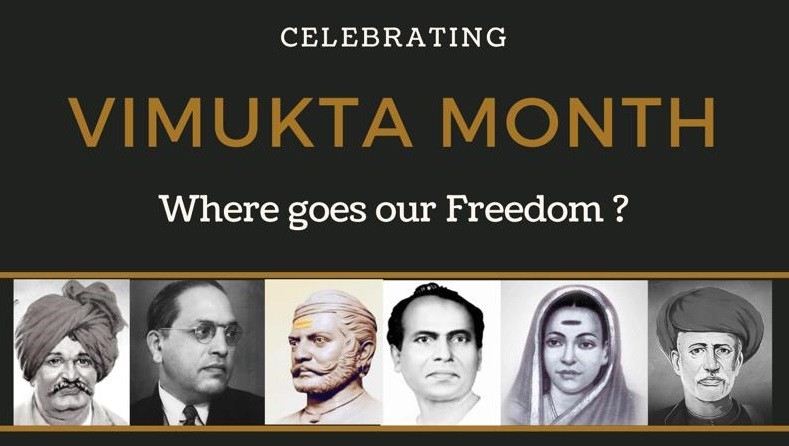
Concept Note: Vimukta Month – Where Goes Our Freedom?
Prepared by – Disha Wadekar and Arati Kade
The struggles, histories, culture and assertions of nomadic and denotified tribes have become a profitable enterprise for many. The discourses of nomadic and denotified communities are invariably set by the oppressor class, who have only dehumanised them further. To counter this, a group of students, activists and academicians from the nomadic and denotified communities are coming together to celebrate Vimukta Month between 1st August to 31st August, this year. The idea is to build their own discourse, organise and celebrate the struggles of their ancestors.
Since 1952 to commemorate the de-notification of communities classified as “criminals” under the Criminal Tribes Act (CTA), 1871; 31st August has been celebrated as “Vimukta Day”. It marks the independence of the Nomadic and Denotified Tribes five years after the country gained independence from British governance.
The British saw criminality through the lens of the pervasive caste system and thus interpreted crime as an inheritable occupation. With the objective of establishing control over Nomadic and Tribal groups resisting the British Indian authorities, in 1871, the CTA ostensibly labelled almost 200 tribal groups as “born criminals.” As they are wandering communities, it was difficult for the colonial government to control them and their rebellions.
During colonial rule, the nomadic, mobile groups were perceived as a “threat” to the settled life and colonial administration. The British not only marked them with the tag of criminality but also destroyed their traditional occupation with the introduction of the new colonial market economy and commercial exploitation of forests.
Although the brutal CTA was repealed in 1952, it was immediately replaced by the Habitual Offenders Act, which was a de-facto continuation of the CTA. Even after 70 years of independence, the freedom for our people, constituting more than 15% of the Indian population remains notional as despite being de-notified, these groups continue to face severe discrimination and ostracism. They are still perceived as social outcastes and “criminal tribes” by upper-caste villagers, unduly harassed and stigmatized by the police and are ignored by the Indian states. There is perpetual stigma, state-sponsored atrocities and social boycotts.
These tribes are constantly harassed by the rest of the society and law enforcement machinery. Surprisingly, even today, there is no legislation to prevent such injustice and the exploitation of DNTs.
The oppressors are both, the state and the society at large. The fruits of independence continue to evade the tribes leading up to “Vimukta Din,” they are raising the question closest to their hearts: Where is our freedom?
There is a need for greater sensitization and awareness among state agencies to ensure that they carry the mandate of law without any prejudice and discrimination. For this reason, the government has appointed several commissions and committees for the development of the DNTs; however, their plight remains unchanged. As their concerns are still unheard, a wider, more inclusive discourse is required to generate awareness and plan strategies to resolve their issues.
Vimukta Month started with the birth centenary of Lokshahir Annabhau Sathe on 1st of August, 2020. He was among the first to depict the social realities of these tribes through his novels, plays, and short stories. The rejected lives of Barbadya Kanjari, Yenku Makadwala, Gilwar, and Yemu have taken centre stage in his writings. In the first week, our guest speakers – Pradeep Mohite, Sangeeta Paikekari and Renukadas Ubale shall explore his writings. This dedication is a humble acknowledgement of Annabhau’s labor.
In the subsequent weeks, the group will be hosting cultural performances, including autobiographical readings, poetry and song recitals depicting NT, DNTs. There will be panel discussions held on weekends with esteemed guests on a wide range of challenges pertaining to NT, DNT lives including gender, health, education and the way forward.
The Initiative is taken by a collective of Nomad Liberty Movement, NT DNT Youth Congress, Anubhuti Charitable Trust, Sangharsh Vahini, Bhoomi Gramotthan, Evam Shabhagi gramin vikas samiti, Morena MP, and Witness for Justice.




+ There are no comments
Add yours